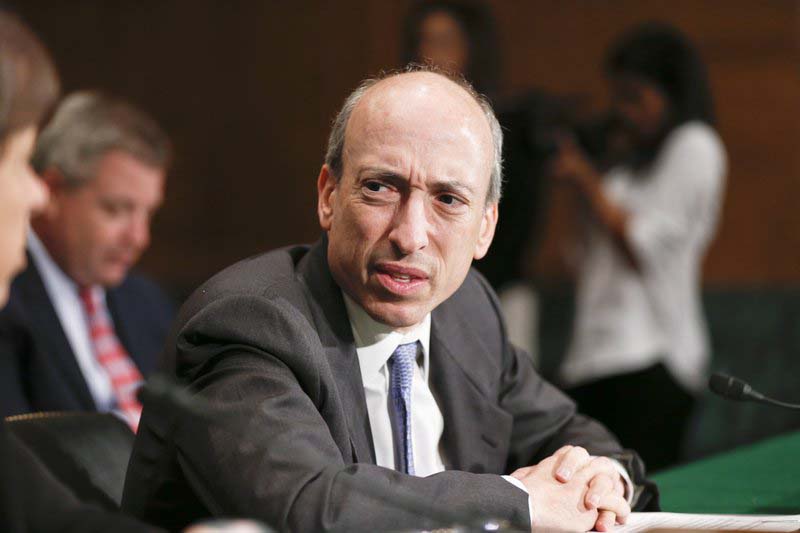

President Joe Biden’s choice to head the Securities and Exchange Commission is coming before a Senate panel for his confirmation hearing at a moment when a roiling stock-trading drama has spurred clamor for tighter regulation of Wall Street.
Gary Gensler, a chairman of the Commodity Futures Trading Commission during the Obama administration, has experience as a tough markets regulator during the financial crisis. More recently he has been in the academic world. Biden’s selection of Gensler to lead the SEC signals a goal of turning the Wall Street watchdog agency toward an activist role after a deregulatory stretch during the Trump administration.
The Senate Banking Committee is weighing Gensler’s confirmation in a virtual hearing Tuesday. Also being vetted and questioned is Rohit Chopra, a member of the Federal Trade Commission who is Biden’s nominee to lead the Consumer Financial Protection Bureau.
Gensler is promising to work toward strengthening transparency and accountability in the markets. That will enable people “to invest with confidence and be protected from fraud and manipulation,” he said in written testimony prepared for the hearing. “It means promoting efficiency and competition, so our markets operate with lower costs to companies and higher returns to investors. … And above all, it means making sure our markets serve the needs of working families.”
The trading frenzy in shares of the struggling video-game retailer GameStop lifted their price 1,600% in January, though they later fell back to Earth after days of wild price swings. A number of big hedge funds had bet that GameStop stock would fall, only to be thwarted by small investors who banded together on social media with a wave of buying that sent the price up. The saga was portrayed as a victory of ordinary investors over Wall Street giants. But some lawmakers charged that the online trading platform Robinhood acted to favor its big Wall Street clients when it blocked its customers on January 28 from buying GameStop shares.
The SEC is investigating. Treasury Secretary Janet Yellen convened a meeting of top federal regulators to discuss the trading turbulence and whether the way the market operates may hurt individual investors.
Allison Herren Lee, the acting SEC chair, has said the agency is examining the role that short-selling may have played in GameStop’s extreme stock moves, as well as potential stock manipulation and whether companies issuing stocks are adequately disclosing risks to investors.
The GameStop episode has bolstered political momentum in the direction of closer regulation of the securities markets, though Republican lawmakers and regulators generally will oppose new rules. Possible avenues for new rules that have been raised include requiring market players to disclose short-selling positions and restricting arrangements of payment for order flow — a common practice in which Wall Street trading firms pay companies like Robinhood to send them their customers’ orders for execution.
Gensler was a leader and adviser of Biden’s presidential transition team responsible for the Federal Reserve, banking issues and securities regulation. He doesn’t appear to face enough opposition to derail his approval by the full Senate, which the Democrats control by a slim margin.
“Gensler will tip the SEC away from making it easy for companies to raise money and toward protecting unsophisticated investors,” says Erik Gordon, assistant business professor at the University of Michigan.
Jay Clayton, a former Wall Street lawyer who headed the SEC during the Trump administration, presided over a deregulatory push to soften rules affecting Wall Street and the financial markets, as President Donald Trump pledged when he took office. Rules under the Dodd-Frank law that tightened the reins on banks and Wall Street in the wake of the 2008-09 financial crisis and the Great Recession were relaxed. Clayton also eased rules for smaller companies raising capital in the market.
With a background of having worked for nearly 20 years at Goldman Sachs, the Wall Street powerhouse investment bank, Gensler surprised many by being a tough regulator of big banks as head of the Commodity Futures Trading Commission. He imposed oversight on the $400 trillion worldwide market for the complex financial instruments that helped spark the 2008-09 crisis. Gensler pushed for stricter regulations that big banks and financial firms had lobbied against, and he wasn’t afraid to take positions that clashed with the Obama administration.
Among his likely priorities as SEC chair would be requirements for corporations to disclose their climate change risks, political spending and executive compensation. Gensler, who co-authored a 2002 book of investing advice for moderate-income people titled ‘The Great Mutual Fund Trap’, also could push for protections in ordinary investors’ relationships with their advisers. He may take up tighter rules for new ‘blank-cheque’ offerings used by companies in developing stages to raise money in the markets, observers say.
Gensler comes armed with receptiveness to new financial technologies and cryptocurrency. As a professor of economics and management at MIT’s Sloan School of Management, he has focused research and teaching on public policy as well as digital currencies and blockchain, the global running ledgers of digital currency transactions.